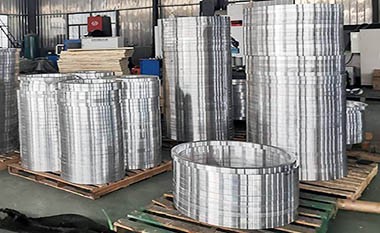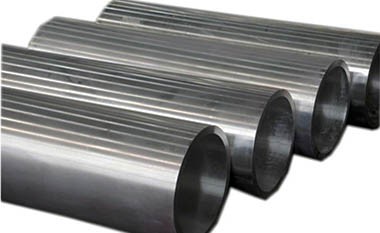7075 aluminum forging
Aluminum forging is a manufacturing process in which aluminum is pressed, hammered, or squeezed under high pressure to form high-strength parts, known as forgings. This process can be carried out at various temperatures, enhancing the material’s performance.
HC Aluminum uses a variety of aluminum alloys, including but not limited to 2024, 6061, and 7075. Each alloy provides unique properties suited for specific applications. We forge alloys from the 2014, 6061, and 7075 series and are also capable of forging more specialized alloys within the 6000 and 7000 series.
The forging products offered by HC Aluminum are not limited to aluminum rings, hubs, discs, round bars, flat bars, step shafts, and blocks.
Advantages of Forging 7075 Aluminum
- Forged 7075 aluminum alloy can be crafted into notably complex or refined shapes.
- Forged 7075 aluminum alloy achieves mechanical properties comparable to steel, with a strength-to-weight ratio surpassing that of steel. Additionally, aluminum forging can yield various surface finishes, from very smooth to relatively sharp.
- 7075 aluminum forgings are often cost-effective and aesthetically pleasing. They offer high design flexibility, and in many cases, the exterior of forged aluminum requires minimal polishing.
Properties of 7075 Aluminum Forgings
7075 aluminum is a high-strength alloy within the 7000 series, primarily alloyed with zinc and includes small amounts of magnesium and copper, giving it exceptional tensile and yield strength.
- High Static Strength: 7075 aluminum is one of the highest-strength commercial aluminum alloys, making it ideal for high-stress environments.
- Good Corrosion Resistance: While 7075 aluminum’s corrosion resistance is lower than some other series, its corrosion resistance can be significantly enhanced through surface treatments like anodizing.
- Good Fatigue Strength: 7075 aluminum has commendable fatigue strength, enabling it to withstand prolonged cyclic stress.
- Moderate Machinability: 7075 aluminum forgings have good machinability and are suitable for precision machining, though complex forming can be challenging.
- Limited Weldability: 7075 aluminum has poor welding performance and is prone to hot cracking, but certain special welding techniques and pre-welding treatments can improve its weldability.
Specification for 7075 aluminum forgings
| FORGING | TYPE | MAX. WEIGHT | MAX. DIMENSION |
| Open Die Forging | Cube | ≤9T | Length≤7000mm, Width≤2000mm, Height≤500mm |
| Disk | ≤5T | Diameter≤2500mm | |
| Ring | ≤5T | Outer diameter of quenching parts≤2500mm, Outer diameter of non-quenching parts≤4000mm, Height≤500mm | |
| Cylinder | ≤5T | Outer diameter 200-800mm, Length≤2000mm; Outer diameter 801-2000mm, Length≤1500mm; | |
| Axle | ≤8T | Length≤7000mm, Diameter≤800mm | |
| Backward Extrusion | Forged Pipe | Outer diameter≤830mm, Inner diameter≤650mm, Length≤1800mm | |
| Closed Die Forging | Common Closed Die Forgings | - | PVA≤3.0 ㎡(Diameter≤1950mm) |
| Complex Closed Die Forgings | - | PVA≤1.5 ㎡(Diameter≤1400mm) |
Chemical composition of 7075 aluminum forgings
| Element | Composition (wt.%) |
| Aluminum | 90.0-91.4 |
| Zinc | 5.1-6.1 |
| Magnesium | 2.1-2.9 |
| Copper | 1.2-2.0 |
| Silicon | 0.40 max |
| Iron | 0.50 max |
| Manganese | 0.30 max |
| Titanium | 0.20 max |
| Chromium | 0.18-0.28 |
| Other | 0.15 max |
7075 Aluminum Forging Temper States
7075 aluminum forgings can achieve different mechanical properties based on the tempering states (also known as heat treatment conditions).
7075-T6 Aluminum Forging
Characteristics: 7075-T6 is the most commonly used temper, known for its exceptionally high hardness and strength, making it the preferred state for applications requiring maximum strength.
Applications: Suitable for aircraft fuselage structures, wing spars, and other high-strength structural components.
7075-T651 Aluminum Forging
Characteristics: T651 is a stress-relieved version of the T6 temper, achieved by stretching to reduce internal stress, further improving stability.
Applications: Ideal for precision parts machining and structural components requiring high dimensional stability, such as aircraft fuselage connectors and engine mounts.
Advantages: Enhances machining stability, reducing the risk of warping and deformation after processing.
7075-T73 Aluminum Forging
Characteristics: The T73 temper undergoes a two-stage heat treatment that significantly enhances the corrosion resistance of 7075 aluminum, with a slight reduction in strength.
Applications: Suitable for high-strength structural components in harsh environments, such as military aircraft parts and marine structural components.
Corrosion Resistance: Greatly improved corrosion resistance, making it ideal for structural components exposed to moist and corrosive environments.
7075-T7351 Aluminum Forging
Characteristics: T7351 is a stress-relieved version of the T73 temper, similar to T651, achieved by stretching to relieve internal stress and enhance dimensional stability.
Applications: Suitable for high-stress aerospace structural components, particularly large aerospace frames, fuselage support beams, and chassis.
Advantages: Excellent corrosion resistance and high dimensional stability, ideal for aerospace parts that require long-term structural stability.
7075-T76 Aluminum Forging
Characteristics: T76 offers a balance between T6 and T73, providing improved corrosion resistance while maintaining high strength.
Applications: Suitable for high-strength structural components in highly corrosive environments, such as key parts on ships and offshore platforms.
Performance Balance: Combines high strength with good corrosion resistance, making it an ideal temper for high-strength components in harsh environments.
General Mechanical Properties of 7075 Aluminum Forging
- Tensile Strength – 83, 000 psi
- Yield Point – 74, 000 psi
- Brinell Hardness – 150
- Elongation at Break – 10%
- Shear Strength – 48, 000 psi
- Thermal Conductivity – 130 W/m-K
- Strength to Weight Ratio: 196 kN-m/kg
7075 Aluminum Forging Applications
1. Aerospace Components
Aircraft Structural Parts: 7075 aluminum forgings are used to manufacture primary structural components in aircraft such as wings, tail sections, and fuselage frames. Its high strength and lightweight characteristics help reduce aircraft weight, enhancing flight efficiency, and its corrosion resistance meets the demands of high-humidity and high-pressure environments.
Landing Gear Assemblies: In landing gear systems, the high fatigue resistance and deformation resistance of 7075 aluminum forgings ensure stability and safety during landing, significantly extending the landing gear's lifespan.
Connectors and Fasteners: With excellent machinability, 7075 aluminum forgings are used to produce critical aircraft connectors, bolts, and fasteners, ensuring tight assembly and stability of aircraft components.
2. Aircraft Accessories
Shafts and Mounts: Various mounts and shafts in aircraft need to withstand high stress. 7075 aluminum forgings provide the required strength, ensuring part stability during high-speed flight and under heavy loads.
Engine Support Structures: Engine support components demand high heat resistance and strength, and heat-treated 7075 aluminum forgings meet these needs, supporting the high-load operation of engines and enhancing overall stability.
3. Bicycle Parts
Frames and Connecting Rods: 7075 aluminum forgings are used for high-end bicycle frames, connecting rods, and pedals, providing exceptional strength and lightweight performance. They are especially suited for off-road and racing bikes, ensuring durability along with a lightweight design.
Wheels and Bearing Mounts: Bicycle wheels and bearing components require high strength, and the compressive properties of 7075 aluminum forgings make them ideal for these parts, capable of withstanding impacts across various terrains.
4. Climbing Equipment
Safety Clips and Hooks: 7075 aluminum forgings are used for key safety clips and hooks in climbing equipment, featuring excellent tensile strength and lightweight properties, ensuring safe use in extreme conditions.
Climbing Frames: Climbing equipment like climbing frames demands high impact resistance. The impact resistance of 7075 aluminum forgings makes them an ideal material, offering climbers added safety.
5. Safety Fixtures
Industrial Safety Railings and Mounts: 7075 aluminum forgings can be used to create high-strength industrial safety railings and mounts. Their corrosion resistance ensures effective safety protection in various harsh environments.
Protective Equipment and Support Components: Safety equipment often requires support components with high strength and stability. The exceptional mechanical strength of 7075 aluminum forgings provides stable safety support, applied in military and industrial safety sectors.
HC Aluminum Aluminum Forging Processes
HC Aluminum offers various aluminum forging methods, including open die forging, closed die forging, and ring forging. These different forging techniques are used to produce various types of aluminum parts and products.
Open Die Forging
Open die forging is a forging method that does not use a mold to restrict the shape. The aluminum billet is repeatedly hammered under a large forging hammer or press until it reaches the desired dimensions and shape. This process is suitable for producing large, irregularly shaped aluminum components.
Advantages of Open Die Forging
- High Impact Strength: The aluminum's fiber structure is optimized through open die forging, providing high impact resistance, which is crucial for high-load applications in industries like aerospace and automotive.
- Superior Internal Integrity: During the forging process, the metal’s grain structure realigns along the shape of the workpiece, eliminating internal voids and providing exceptional internal integrity. This feature enables open die forged aluminum to better withstand high pressure and stress.
- High Pressure Resistance: Open die forged parts can endure extreme pressures, performing excellently in aerospace components (e.g., landing gear and connecting rods) and machine parts (e.g., large hydraulic parts).
- Good Mechanical Properties: The strength and toughness of aluminum are enhanced in forging, making it particularly suitable for applications that require high strength in industrial settings.
Characteristics of Open Die Forging
- Flexibility: Due to relatively simple mold design, molds can be quickly changed to adapt to different product demands.
- Cost-Effectiveness: Suitable for small batch production with lower mold costs, making it ideal for startups or small-scale production.
- Ability to Forge Large Parts: Capable of producing large aluminum forgings, widely used in aerospace, shipbuilding, and other fields.
Closed Die Forging
Closed die forging, also known as impression die forging, is a forging process conducted within a closed mold. Compared to open die forging, closed die forging can produce more complex and precise parts. This process is suitable for producing high-precision components, especially small parts with intricate shapes.
Characteristics of Closed Die Forging
- High Precision: Closed die forging allows for high-precision shaping, eliminating the dimensional errors common in open die forging, making it ideal for components with strict dimensional requirements.
- Complex Shapes: Closed die forging enables the aluminum billet to be shaped into complex geometries with minimal post-processing.
- High Material Utilization: Closed die forging maximizes the use of aluminum, reducing processing losses and improving material utilization.
Ring Forging
Ring forging is a specialized process for producing ring-shaped aluminum forgings. Its main characteristic is that heated aluminum is forged in a ring-shaped mold to form parts with a ring-shaped cross-section. This method is commonly used to produce seamless rings.
Characteristics of Ring Forging
- Dimensional Stability: The ring forging process provides uniform wall thickness and diameter, ensuring the dimensional accuracy and structural stability of the ring parts.
- High Strength and Durability: Ring forged aluminum parts exhibit high strength and can withstand considerable radial pressure, making them suitable for use in high-stress, high-temperature environments.
- Suitable for Large-Diameter Rings: Capable of producing large-diameter, thick-walled ring-shaped aluminum forgings, suitable for specific industrial applications.
- Enhanced Material Properties: The aluminum structure is well-optimized during the ring forging process, ensuring excellent performance under high pressure and high temperature.
- Efficient Production: Suitable for large-scale production, with high production efficiency.


